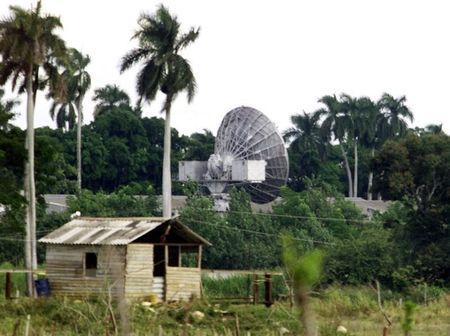By Lidia Kelly
MOSCOW (Reuters) - Russia has reached a provisional agreement with Cuba to reopen a big Soviet-era base on the Caribbean island from which it once spied in the United States, a Russian security source said on Wednesday.
The move comes as U.S.-Russian relations have reached a post-Cold War low in a dispute over Ukraine.
"A framework agreement has been agreed," the source told Reuters, confirming a report in the daily Kommersant newspaper that the reopening was approved in principle during a visit to Cuba last week by President Vladimir Putin.
In Washington, State Department spokeswoman Jen Psaki declined to comment, noting there was no formal announcement from Moscow. Other U.S. officials were sceptical, questioning whether Russia would go through with what would be an expensive initiative with possible limited returns. When they closed the base, the Russians said it was a "goodwill gesture" toward Washington, although many U.S. officials at the time believed Moscow was really concerned about costs. One officials who asked not to be named called Russian statements and news reports about the project "propaganda."
At the height of the Cold War, the base at Lourdes, just south of the capital Havana, had up to 3,000 personnel and was the biggest centre Moscow operated abroad for gathering intelligence from radio signals.
The base, 250 km (150 miles) from the U.S. coast, was also used to provide communications for Russian ships.
Government and Kremlin officials did not immediately comment. The base was closed in 2001. Discussions about its reopening began several years ago and intensified this year, Kommersant said, as relations with the United States deteriorated.
Since the Ukraine crisis worsened in February, the United States and the European Union have imposed sanctions on Russia and Moscow has tried to bolster ties with other countries, including in Asia and Latin America, to ensure Russia is not isolated.
Kommersant gave no financial details about the agreement, but noted Russia agreed before Putin's visit to forgive 90 percent of Cuba's $32 billion Soviet-era debt.
Putin, who is attending a summit of the BRICS emerging market powers in Brazil, also visited Argentina last week. While visiting Cuba, the Russian leader pledged to help revive its former Cold War-era ally's offshore oil exploration.. In Argentina, he signed a trade deal intended to increase Russia's influence in the region.
EXPERTS SEE BASE AS BOOST FOR RUSSIA
Russian defence experts said reopening the base would be a logical move for Russia, increasing its ability to gather intelligence by intercepting signals "quite significantly."
"One needs to remember that Russia's technical intelligence abilities are very weak. This will help," said Ivan Konovalov, head of the Moscow-based Center for Strategic Trends Studies.
He estimated that Moscow received at least 50 percent of all radio-intercepted intelligence on the United States through Lourdes during the Cold War.
Sergey Ermakov, head of the Regional Security Section at the Russian Institute for Strategic Studies, said the Cuba move was designed to show other countries Moscow will support them.
"After what's happened in Ukraine, with all these alliances the United States has developed, Russia is showing it's joining the game and that it too can lean on allies and form alliances." he said.
The base at Lourdes was created in 1964 after the Cuban missile crisis to gather intelligence. It monitored signals from and to submarines and ships, as well as satellite communications.

The Cuban missile crisis in 1962, which began after Moscow proposed placing Soviet nuclear weapons on the island, is widely regarded as the moment in the Cold War when the United States and the Soviet Union came closest to a nuclear confrontation.
(Writing by Timothy Heritage. Editing by Jeremy Gaunt and Andre Grenon)
